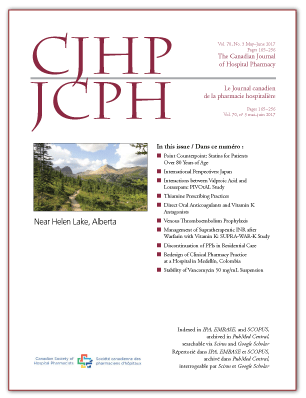Outcome after Discontinuation of Proton Pump Inhibitors at a Residential Care Site: Quality Improvement Project
DOI:
https://doi.org/10.4212/cjhp.v70i3.1661Keywords:
proton pump inhibitors, residential care, elderly population, polypharmacy, deprescribing, discontinuation, inhibiteurs de la pompe à protons, soins en établissement, personnes âgées, polypharmacie, déprescription, interruptionAbstract
ABSTRACT
Background: Increased prescribing of proton pump inhibitors (PPIs) in the past few decades can be attributed mainly to long-term use of this type of therapy. Recent evidence indicates signals of harm associated with long-term use of PPIs, such as increased risk of Clostridium difficile infection, recurrence of C. difficile infection, and fracture. A few studies have assessed the effectiveness of step-down management of patients receiving long-term PPI therapy in ambulatory care settings. However, it is unknown whether PPIs can be discontinued in older people without return of gastrointestinal symptoms.
Objectives: To determine the proportion of residents receiving long-term PPI therapy who were able to discontinue the drug without experiencing gastrointestinal symptoms warranting recommencement of the PPI or initiation of a histamine-2 receptor antagonist.
Methods: The records of residents who had been taking a PPI for longer than 6 months at a single residential care site were audited by one pharmacist to determine the PPI indication. For residents who fit the criteria for discontinuation (no indication for long-term PPI therapy, not currently experiencing gastrointestinal symptoms, no previous trial of PPI discontinuation without success, and no anxiety when medications are discontinued), the pharmacist faxed a recommendation to discontinue PPI therapy without tapering to the physicians’ offices. For cases in which the recommendation was accepted, 3 pharmacists followed the residents weekly for 8 weeks to assess whether gastrointestinal symptoms returned.
Results: The pharmacist identified 28 residents who fit the criteria, and the recommendation to discontinue therapy was accepted for 27. At 8 weeks after the intervention, 19 (70%) of these residents were still asymptomatic and did not require re-initiation of medications to manage their gastrointestinal symptoms.
Conclusions: These results support discontinuation of long-term PPI therapy for older people who fit the criteria for discontinuation. The study provided limited evidence to support the use of tapering. However, tapering can be used to identify the lowest effective dose and may increase patient comfort with deprescribing. Further research is needed to determine the effects of and best approaches to PPI discontinuation in older populations.
RÉSUMÉ
Contexte : L’augmentation des prescriptions d’inhibiteurs de la pompe à protons (IPP) au cours des dernières décennies peut être attribuée principalement à l’utilisation à long terme de ce type de traitement. Des données récentes indiquent que l’utilisation à long terme des IPP comporte des dangers potentiels, notamment une augmentation du risque d’infection par Clostridium difficile, de récurrence de cette infection et de fracture. Quelques études ont évalué l’efficacité de la déprescription des IPP chez des patients recevant un traitement prolongé en milieu ambulatoire. Cependant, on ne sait pas s’il est possible de cesser l’utilisation d’IPP chez le patient âgé tout en évitant la réapparition de symptômes gastro-intestinaux.
Objectif : Déterminer la proportion de résidents pour qui l’on a été en mesure de cesser le traitement à long terme par IPP sans qu’apparaissent des symptômes gastro-intestinaux nécessitant la reprise du traitement par IPP ou l’amorce d’un traitement par antagoniste des récepteurs H2 de l’histamine.
Méthodes : L’étude a eu lieu dans un seul centre d’hébergement et de soins de longue durée. Un pharmacien y a analysé les dossiers médicaux des résidents qui prenaient des IPP depuis plus de six mois afin de déterminer l’indication du médicament. Pour les résidents répondant aux critères de déprescription (aucune indication pour un traitement d’entretien, aucun symptôme gastro-intestinal à l’heure actuelle, aucune tentative antérieure de déprescrire un IPP en vain et aucune réaction anxieuse à l’arrêt de traitements), le pharmacien a envoyé par télécopieur aux bureaux des médecins un document recommandant l’interruption du traitement par IPP sans posologie dégressive. Dans les cas où la recommandation a été acceptée, trois pharmaciens ont suivi hebdomadairement les résidents pendant huit semaines afin de vérifier si des symptômes gastro-intestinaux réapparaissaient.
Résultats : Le pharmacien a repéré 28 résidents répondant aux critères et la recommandation d’interruption de traitement a été acceptée pour 27 d’entre eux. Huit semaines après l’intervention, 19 (70 %) de ces résidents étaient toujours asymptomatiques et n’ont pas eu besoin qu’on leur prescrive de nouveau des médicaments pour traiter des symptômes gastro-intestinaux.
Conclusions : Ces résultats viennent appuyer l’interruption du traitement à long terme d’IPP chez le patient âgé qui répond aux critères d’interruption. Cette étude n’a founi que peu de preuves qui appuient le recours à la posologie dégressive. Cependant, celle-ci peut servir à déterminer quelle est la plus faible dose efficace et elle peut aider les patients à être plus à l’aise avec l’interruption du traitement. Des recherches plus approfondies sont nécessaires pour préciser les conséquences de l’arrêt des IPP chez les personnes âgées et la meilleure approche à cette fin.
Downloads
Published
Issue
Section
License
Copyright © Canadian Society of Healthcare-Systems Pharmacy.
After publication of a manuscript in the CJHP, the authors of the manuscript must obtain written permission from the CSHP (publications@cshp.ca) before reproducing any text, figures, tables, or illustrations from the work in future works of their own. If a submitted manuscript is declined for publication in the CJHP, all said rights shall revert to the authors. Please note that any forms (e.g., preprinted orders and patient intake forms) used by a specific hospital or other health care facility and included as illustrative material with a manuscript are exempt from this copyright transfer. The CJHP will require a letter from the hospital or health care facility granting permission to publish the document(s).










